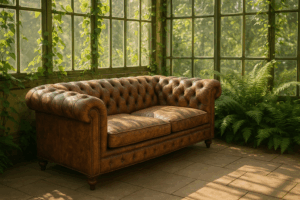Chesterfield Wiki
Official wiki of Chesterfield information
Investing in a genuine, handmade Chesterfield sofa is a significant decision. It’s the difference between owning a piece of furniture with soul and longevity versus a mass-produced imitation. This guide reveals the expert secrets to identifying authentic craftsmanship, ensuring your investment is in a true heirloom-quality piece.
Contents
The Frame: Tell-Tale Signs of Solid Wood
The foundation of any handmade Chesterfield is its frame. Authentic pieces use kiln-dried hardwoods like oak or beech, which are resistant to warping and ensure structural integrity for decades. To check, try to lift one end of the sofa; a genuine Chesterfield will be substantially heavy. Peek underneath—you should see a solid wooden frame, often with dovetail or mortise-and-tenon joints, not staples or particleboard.
- Check the Weight: A true Chesterfield is incredibly heavy due to its dense hardwood frame.
- Inspect the Underside: Look for the grain and color variations of real wood, not uniform composite materials.
- Ask the Retailer: Reputable sellers will be transparent about the frame’s construction materials.
The Springs: A Foundation of Support
The seating comfort of a handmade Chesterfield comes from its traditional spring system. Run your hand over the seat cushion; you should feel the tops of the individual springs through the padding. Sit down and listen—you might hear a gentle creak from the hand-tied, coiled springs settling, a hallmark of traditional craftsmanship. Modern, mass-produced sofas often use flat, serpentine springs or webbing that lack this characteristic feel and sound.
The Tufting: A Masterclass in Precision
Deep button tufting is the Chesterfield’s signature. On a handmade piece, this is a labor-intensive process. Examine the diamond pattern on the back and arms. The stitching should be tight and uniform, with the leather or fabric pulled deeply and consistently into each button. The buttons themselves should be firm and securely anchored from the inside out, not simply glued on. Imperfect, slightly asymmetrical patterns can sometimes indicate human craftsmanship rather than machine perfection.
- Tug Test: Gently tug on a button. It should not come loose, as it’s anchored with twine through the entire upholstery.
- Check the Depth: The tufting should create significant, uniform pockets, contributing to the classic, plush look.
- Look at the Reverse: On the back of the sofa, the tufting should be just as deep and well-executed as on the front.
The Leather: Natural Variations and Finish
The leather on a handmade Chesterfield tells a story. Top-grain or full-grain hides are used, which retain the hide’s natural markings, texture, and grain. No two sections will look identical; you should see subtle variations in color, texture, and even small scars. This is a sign of quality, not a defect. In contrast, faux leather or corrected-grain leather used on cheaper models will have a uniform, plastic-like appearance and feel.
Conclusion
Identifying a handmade Chesterfield requires a discerning eye, but the clues are clear. By focusing on the foundational elements, you can confidently distinguish a timeless masterpiece from a fleeting replica.
- Prioritize a heavy, solid wood frame over lightweight composites.
- Seek out the distinctive feel and sound of a hand-tied spring system.
- Scrutinize the tufting for depth, uniformity, and secure button attachment.
- Embrace the unique character of natural, high-quality leather hides.
- Always purchase from reputable dealers who value and verify craftsmanship.
Read more at https://chesterfielddeals.com/category/chesterfield/how-can-i-tell-if-a-chesterfield-is-handmade/
The Ultimate Chesterfield Sofa Buying Guide for 2024
How to Clean and Condition Your Leather Chesterfield
Chesterfield vs. Modern Sofa: Which is Right for Your Home?
The Rich History of the Chesterfield Sofa

